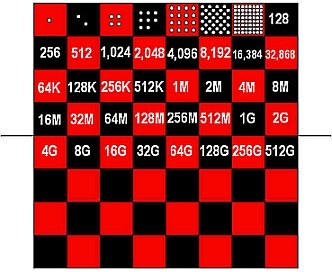|
| ||
|
| ||
Exponential Growth and the Legend of Paal Paysam
Exponential Growth is an immensely powerful concept. To help us grasp it better let us use an ancient Indian chess legend as an example. The legend goes that the tradition of serving Paal Paysam to visiting pilgrims started after a game of chess between the local king and the lord Krishna himself. (picture of 18th century Miniature of Lord Krishna playing Chess against Radha from National Museum, New Delhi) The king was a big chess enthusiast and had the habit of challenging wise visitors to a game of chess. One day a traveling sage was challenged by the king. To motivate his opponent the king offered any reward that the sage could name. The sage modestly asked just for a few grains of rice in the following manner: the king was to put a single grain of rice on the first chess square and double it on every consequent one. Having lost the game and being a man of his word the king ordered a bag of rice to be brought to the chess board. Then he started placing rice grains according to the arrangement: 1 grain on the first square, 2 on the second, 4 on the third, 8 on the fourth and so on:
Following the exponential growth of the rice payment the king quickly realized that he was unable to fulfill his promise because on the twentieth square the king would have had to put 1,000,000 grains of rice. On the fortieth square the king would have had to put 1,000,000,000 grains of rice. And, finally on the sixty fourth square the king would have had to put more than 18,000,000,000,000,000,000 grains of rice which is equal to about 210 billion tons and is allegedly sufficient to cover the whole territory of India with a meter thick layer of rice. At ten grains of rice per square inch, the above amount requires rice fields covering twice the surface area of the Earth, oceans included. It was at that point that the lord Krishna revealed his true identity to the king and told him that he doesn't have to pay the debt immediately but can do so over time. That is why to this day visiting pilgrims are still feasting on Paal Paysam and the king's debt to lord Krishna is still being repaid. Do you want to sumbit your own singularity content?Do you agree or disagree with the content of this page? Do you want to improve it? Do you want to post some great singularity content of your own? Why not share it here at Singularity Symposium?! What Other Visitors Have SaidClick below to see contributions from other visitors to this page...
Exponential Growth and the Legend of Paal Paysam article corrections
i know the number on the 64th square!
Synaptic Sinfulness Not rated yet
Correction to final square: 2^63 not 2^64 grains of rice Not rated yet
I have made a spreadsheet with data from various sources. Not rated yet
Slight error in Exponential Growth and the Legend of Paal Paysam Not rated yet Return from Exponential Growth to Singularity Symposium Home |
|
|
|
| ||
|
| ||
|
Copyright © 2012 - www.SingularitySymposium.com - All Rights Reserved
| ||

